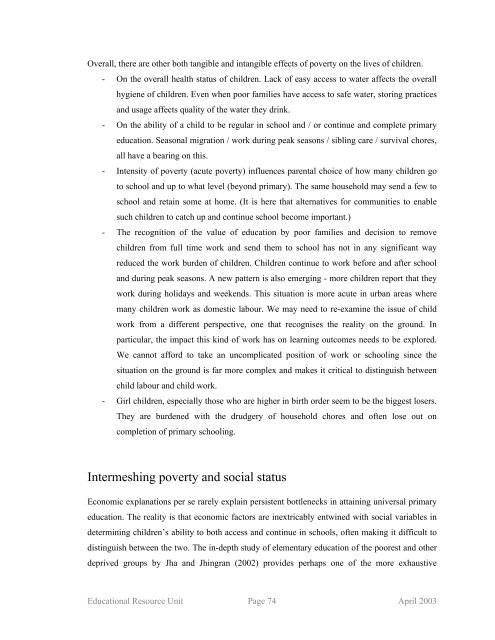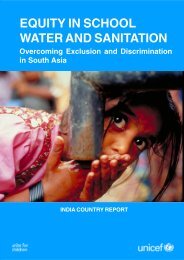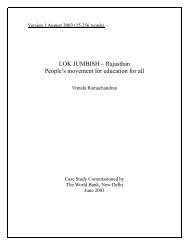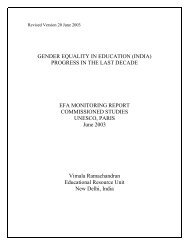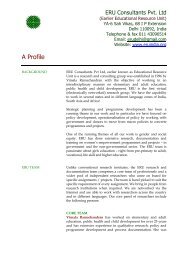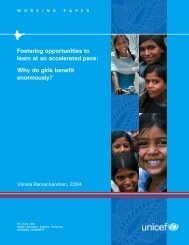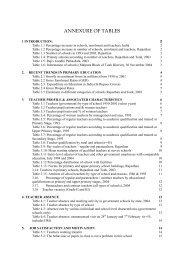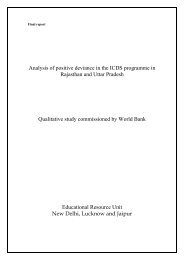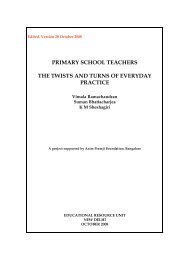Snakes and Ladders - ERU Consultants Pvt. Ltd.
Snakes and Ladders - ERU Consultants Pvt. Ltd.
Snakes and Ladders - ERU Consultants Pvt. Ltd.
You also want an ePaper? Increase the reach of your titles
YUMPU automatically turns print PDFs into web optimized ePapers that Google loves.
Overall, there are other both tangible <strong>and</strong> intangible effects of poverty on the lives of children.<br />
- On the overall health status of children. Lack of easy access to water affects the overall<br />
hygiene of children. Even when poor families have access to safe water, storing practices<br />
<strong>and</strong> usage affects quality of the water they drink.<br />
- On the ability of a child to be regular in school <strong>and</strong> / or continue <strong>and</strong> complete primary<br />
education. Seasonal migration / work during peak seasons / sibling care / survival chores,<br />
all have a bearing on this.<br />
- Intensity of poverty (acute poverty) influences parental choice of how many children go<br />
to school <strong>and</strong> up to what level (beyond primary). The same household may send a few to<br />
school <strong>and</strong> retain some at home. (It is here that alternatives for communities to enable<br />
such children to catch up <strong>and</strong> continue school become important.)<br />
- The recognition of the value of education by poor families <strong>and</strong> decision to remove<br />
children from full time work <strong>and</strong> send them to school has not in any significant way<br />
reduced the work burden of children. Children continue to work before <strong>and</strong> after school<br />
<strong>and</strong> during peak seasons. A new pattern is also emerging - more children report that they<br />
work during holidays <strong>and</strong> weekends. This situation is more acute in urban areas where<br />
many children work as domestic labour. We may need to re-examine the issue of child<br />
work from a different perspective, one that recognises the reality on the ground. In<br />
particular, the impact this kind of work has on learning outcomes needs to be explored.<br />
We cannot afford to take an uncomplicated position of work or schooling since the<br />
situation on the ground is far more complex <strong>and</strong> makes it critical to distinguish between<br />
child labour <strong>and</strong> child work.<br />
- Girl children, especially those who are higher in birth order seem to be the biggest losers.<br />
They are burdened with the drudgery of household chores <strong>and</strong> often lose out on<br />
completion of primary schooling.<br />
Intermeshing poverty <strong>and</strong> social status<br />
Economic explanations per se rarely explain persistent bottlenecks in attaining universal primary<br />
education. The reality is that economic factors are inextricably entwined with social variables in<br />
determining children’s ability to both access <strong>and</strong> continue in schools, often making it difficult to<br />
distinguish between the two. The in-depth study of elementary education of the poorest <strong>and</strong> other<br />
deprived groups by Jha <strong>and</strong> Jhingran (2002) provides perhaps one of the more exhaustive<br />
Educational Resource Unit Page 74 April 2003


